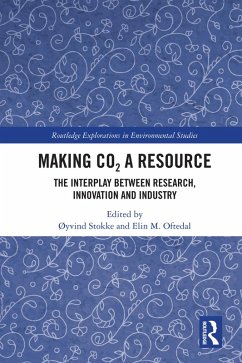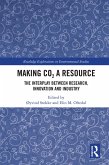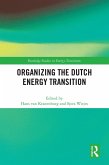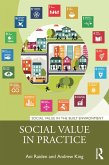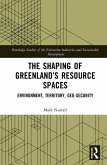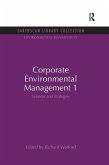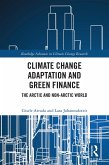Making CO2 a Resource (eBook, ePUB)
The Interplay Between Research, Innovation and Industry
Redaktion: Stokke, Øyvind; Oftedal, Elin M.
41,95 €
41,95 €
inkl. MwSt.
Sofort per Download lieferbar

21 °P sammeln
41,95 €
Als Download kaufen

41,95 €
inkl. MwSt.
Sofort per Download lieferbar

21 °P sammeln
Jetzt verschenken
Alle Infos zum eBook verschenken
41,95 €
inkl. MwSt.
Sofort per Download lieferbar
Alle Infos zum eBook verschenken

21 °P sammeln
Making CO2 a Resource (eBook, ePUB)
The Interplay Between Research, Innovation and Industry
Redaktion: Stokke, Øyvind; Oftedal, Elin M.
- Format: ePub
- Merkliste
- Auf die Merkliste
- Bewerten Bewerten
- Teilen
- Produkt teilen
- Produkterinnerung
- Produkterinnerung

Bitte loggen Sie sich zunächst in Ihr Kundenkonto ein oder registrieren Sie sich bei
bücher.de, um das eBook-Abo tolino select nutzen zu können.
Hier können Sie sich einloggen
Hier können Sie sich einloggen
Sie sind bereits eingeloggt. Klicken Sie auf 2. tolino select Abo, um fortzufahren.

Bitte loggen Sie sich zunächst in Ihr Kundenkonto ein oder registrieren Sie sich bei bücher.de, um das eBook-Abo tolino select nutzen zu können.
This interdisciplinary book explores how CO2 can become a resource instead of a waste, and as such, be a tool to meet one of the grandest challenges humanity is facing: climate change.
- Geräte: eReader
- mit Kopierschutz
- eBook Hilfe
Andere Kunden interessierten sich auch für
![Making CO2 a Resource (eBook, PDF) Making CO2 a Resource (eBook, PDF)]() Making CO2 a Resource (eBook, PDF)41,95 €
Making CO2 a Resource (eBook, PDF)41,95 €![Organizing the Dutch Energy Transition (eBook, ePUB) Organizing the Dutch Energy Transition (eBook, ePUB)]() Organizing the Dutch Energy Transition (eBook, ePUB)41,95 €
Organizing the Dutch Energy Transition (eBook, ePUB)41,95 €![Social Value in Practice (eBook, ePUB) Social Value in Practice (eBook, ePUB)]() Ani RaidenSocial Value in Practice (eBook, ePUB)49,95 €
Ani RaidenSocial Value in Practice (eBook, ePUB)49,95 €![The Shaping of Greenland's Resource Spaces (eBook, ePUB) The Shaping of Greenland's Resource Spaces (eBook, ePUB)]() Mark NuttallThe Shaping of Greenland's Resource Spaces (eBook, ePUB)41,95 €
Mark NuttallThe Shaping of Greenland's Resource Spaces (eBook, ePUB)41,95 €![Corporate Environmental Management 1 (eBook, ePUB) Corporate Environmental Management 1 (eBook, ePUB)]() Corporate Environmental Management 1 (eBook, ePUB)51,95 €
Corporate Environmental Management 1 (eBook, ePUB)51,95 €![Climate Adaptation Finance and Investment in California (eBook, ePUB) Climate Adaptation Finance and Investment in California (eBook, ePUB)]() Jesse M. KeenanClimate Adaptation Finance and Investment in California (eBook, ePUB)0,00 €
Jesse M. KeenanClimate Adaptation Finance and Investment in California (eBook, ePUB)0,00 €![Climate Change Adaptation and Green Finance (eBook, ePUB) Climate Change Adaptation and Green Finance (eBook, ePUB)]() Gisele ArrudaClimate Change Adaptation and Green Finance (eBook, ePUB)41,95 €
Gisele ArrudaClimate Change Adaptation and Green Finance (eBook, ePUB)41,95 €-
-
-
This interdisciplinary book explores how CO2 can become a resource instead of a waste, and as such, be a tool to meet one of the grandest challenges humanity is facing: climate change.
Dieser Download kann aus rechtlichen Gründen nur mit Rechnungsadresse in A, B, BG, CY, CZ, D, DK, EW, E, FIN, F, GR, HR, H, IRL, I, LT, L, LR, M, NL, PL, P, R, S, SLO, SK ausgeliefert werden.
Produktdetails
- Produktdetails
- Verlag: Taylor & Francis eBooks
- Seitenzahl: 224
- Erscheinungstermin: 3. Juni 2024
- Englisch
- ISBN-13: 9781040032480
- Artikelnr.: 70265568
- Verlag: Taylor & Francis eBooks
- Seitenzahl: 224
- Erscheinungstermin: 3. Juni 2024
- Englisch
- ISBN-13: 9781040032480
- Artikelnr.: 70265568
- Herstellerkennzeichnung Die Herstellerinformationen sind derzeit nicht verfügbar.
Øyvind Stokke is Associate Professor in the Department of Philosophy at UiT The Arctic University of Norway. His research focuses on environmental philosophy and degrowth, climate ethics, the assessment of technological sustainability, and deliberative democracy theory. Stokke has been co-leading the research project Transforming CO2 to capital by interdisciplinary CCU optimisation strategies (iCCU) (UiT 2017-2023), which explores CO2 Capture and Utilisation (CCU) by taking into account environmental, ethical, informationtechnological and economic aspects, and was the leader of the pre-project The ARC Methodology (UiT 2021) exploring the grounds for a methodology assessing technological sustainability based on synergy effects between nature and technology. He was member of the research consortium in the project Political Philosophy looks to Antarctica (RCN 2017-2020) which explored moral and legal issues of natural resource justice in the Antarctic Treaty System. Stokke initiated and led Environmental Philosophy Research Group and was a member of the leader group of the Arctic Center for Sustainable Energy at the UiT from 2016 to 2020. Elin M. Oftedal is a professor of Change Management and Innovation at the Institute of Media and Social Sciences at the University of Stavanger. Her research focuses on sustainable and responsible innovation and entrepreneurship, institutional change, legitimacy, cultural entrepreneurship, and entrepreneurial universities. She has initiated, participated in and co-led impactful projects, such as on academic entrepreneurship: "Academic Entrepreneurship- from University Research to Implementation and Commercialization of Innovations - a Comparative Study." Responsible innovation: "Digitalize or Die: Dynamic Drivers of Responsible Research and Innovation in Health and Welfare Service" and "Releasing the Power of Users - Articulating User Interest to Accelerate New Innovative Pathways in the Digital Health and Welfare Sector." Sustainable business practices in: Transforming CO2 to Capital by Interdisciplinary CCU Optimisation Strategies (iCCU). She is a member of the AFINO network, which goal is to establish broad dialogues and shared commitments to ensure that innovation contributes to a more just, inclusive and sustainable Norway.
1. Making CO2 a resource: Green innovation for an ecological economy. An introduction
Øyvind Stokke and Elin M. Oftedal
2. Industrial CO2 capturing by mass cultivation of microalgae (diatoms): Processes, sustainability and applications
Hans Chr. Eilertsen, Richard A. Ingebrigtsen, and Anja Striberny
3. New marine ingredients for future salmonid feeds
Sten Ivar Siikavuopio & Edel Elvevoll
4. Sustainable Development Goals, Human Rights, and the Capability Approach in an Arctic context
Anna-Karin M. Andersson
5. Transforming Resources: The University as a CO2 Catalyst
Elin M. Oftedal and Øyvind Stokke
6. IoT expectations and challenges in monitoring the bio-reactors
Roopam Bamal, Daniel Bamal, and Singara Singh Kasana
7. From CCS to CCU and CCUS - the pitfalls of utilization and storage
Oluf Langhelle, Siddharth Sareen, and Benjamin R. Silvester
8. Black is the New Green: Sustainable diffusion of Innovation
Ukeje Agwu, Tahrir Jaber, and Elin M. Oftedal
9. Attuning Our Consumption and Food Production Systems to the Environmental Reality: An Environmental Virtue Ethics Approach to Algae Based Carbon Capture and Utilization, and Feed Use in Salmon Farming
Erik Strømsheim
10. Unifying the threads: IS Carbon a Resource?
Øyvind Stokke and Elin M. Oftedal
Index
Øyvind Stokke and Elin M. Oftedal
2. Industrial CO2 capturing by mass cultivation of microalgae (diatoms): Processes, sustainability and applications
Hans Chr. Eilertsen, Richard A. Ingebrigtsen, and Anja Striberny
3. New marine ingredients for future salmonid feeds
Sten Ivar Siikavuopio & Edel Elvevoll
4. Sustainable Development Goals, Human Rights, and the Capability Approach in an Arctic context
Anna-Karin M. Andersson
5. Transforming Resources: The University as a CO2 Catalyst
Elin M. Oftedal and Øyvind Stokke
6. IoT expectations and challenges in monitoring the bio-reactors
Roopam Bamal, Daniel Bamal, and Singara Singh Kasana
7. From CCS to CCU and CCUS - the pitfalls of utilization and storage
Oluf Langhelle, Siddharth Sareen, and Benjamin R. Silvester
8. Black is the New Green: Sustainable diffusion of Innovation
Ukeje Agwu, Tahrir Jaber, and Elin M. Oftedal
9. Attuning Our Consumption and Food Production Systems to the Environmental Reality: An Environmental Virtue Ethics Approach to Algae Based Carbon Capture and Utilization, and Feed Use in Salmon Farming
Erik Strømsheim
10. Unifying the threads: IS Carbon a Resource?
Øyvind Stokke and Elin M. Oftedal
Index
1. Making CO2 a resource: Green innovation for an ecological economy. An introduction
Øyvind Stokke and Elin M. Oftedal
2. Industrial CO2 capturing by mass cultivation of microalgae (diatoms): Processes, sustainability and applications
Hans Chr. Eilertsen, Richard A. Ingebrigtsen, and Anja Striberny
3. New marine ingredients for future salmonid feeds
Sten Ivar Siikavuopio & Edel Elvevoll
4. Sustainable Development Goals, Human Rights, and the Capability Approach in an Arctic context
Anna-Karin M. Andersson
5. Transforming Resources: The University as a CO2 Catalyst
Elin M. Oftedal and Øyvind Stokke
6. IoT expectations and challenges in monitoring the bio-reactors
Roopam Bamal, Daniel Bamal, and Singara Singh Kasana
7. From CCS to CCU and CCUS - the pitfalls of utilization and storage
Oluf Langhelle, Siddharth Sareen, and Benjamin R. Silvester
8. Black is the New Green: Sustainable diffusion of Innovation
Ukeje Agwu, Tahrir Jaber, and Elin M. Oftedal
9. Attuning Our Consumption and Food Production Systems to the Environmental Reality: An Environmental Virtue Ethics Approach to Algae Based Carbon Capture and Utilization, and Feed Use in Salmon Farming
Erik Strømsheim
10. Unifying the threads: IS Carbon a Resource?
Øyvind Stokke and Elin M. Oftedal
Index
Øyvind Stokke and Elin M. Oftedal
2. Industrial CO2 capturing by mass cultivation of microalgae (diatoms): Processes, sustainability and applications
Hans Chr. Eilertsen, Richard A. Ingebrigtsen, and Anja Striberny
3. New marine ingredients for future salmonid feeds
Sten Ivar Siikavuopio & Edel Elvevoll
4. Sustainable Development Goals, Human Rights, and the Capability Approach in an Arctic context
Anna-Karin M. Andersson
5. Transforming Resources: The University as a CO2 Catalyst
Elin M. Oftedal and Øyvind Stokke
6. IoT expectations and challenges in monitoring the bio-reactors
Roopam Bamal, Daniel Bamal, and Singara Singh Kasana
7. From CCS to CCU and CCUS - the pitfalls of utilization and storage
Oluf Langhelle, Siddharth Sareen, and Benjamin R. Silvester
8. Black is the New Green: Sustainable diffusion of Innovation
Ukeje Agwu, Tahrir Jaber, and Elin M. Oftedal
9. Attuning Our Consumption and Food Production Systems to the Environmental Reality: An Environmental Virtue Ethics Approach to Algae Based Carbon Capture and Utilization, and Feed Use in Salmon Farming
Erik Strømsheim
10. Unifying the threads: IS Carbon a Resource?
Øyvind Stokke and Elin M. Oftedal
Index
